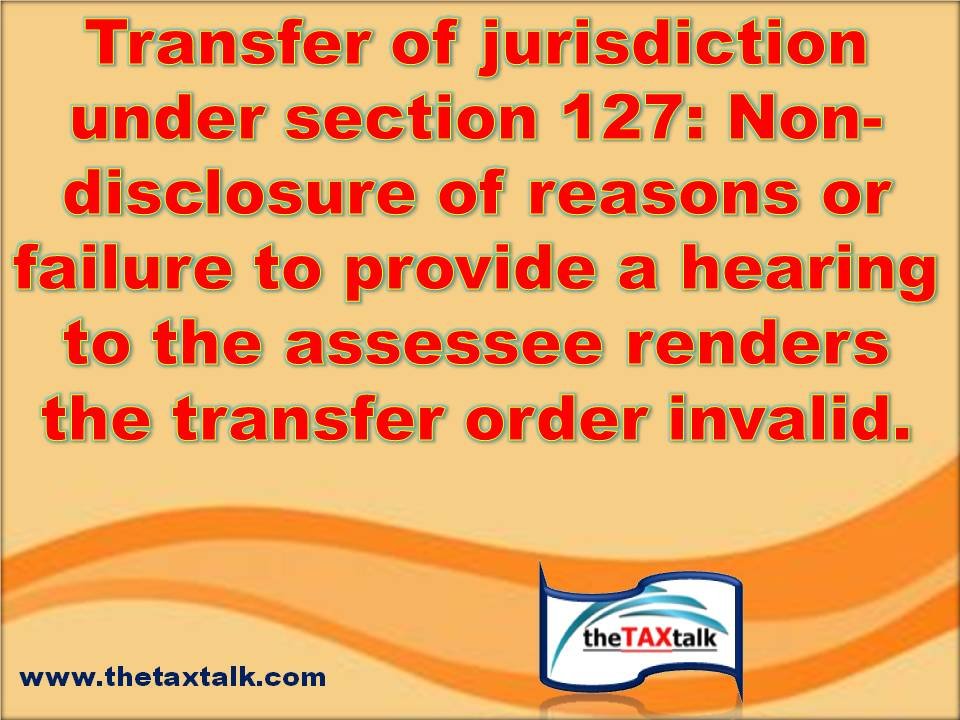![]()
Transfer of jurisdiction under section 127: Non-disclosure of reasons or failure to provide a hearing to the assessee renders the transfer order invalid.
Recently, the Calcutta High Court has held that Non-disclosure of reasons or failure to provide a hearing to the assessee renders the transfer order invalid in case of transfer of jurisdiction of AO U/s 127..
The case details is as under:
Pradeep Kumar Kajaria vs. Union of India & Ors. :-
Calcutta High Court
W.P.O. No. 835 of 2024
Dated: December 4, 2024
Let us have a Short Overview of the case:
1. Petitioner’s Background:
• Regular income tax filer in Kolkata under PAN No. AFJPK5331E.
• Assessed under ITO, Ward 36(1), Kolkata, and a permanent resident of Kolkata.
• Partner in Saraidhela Developers LLP, with operations in Dhanbad.
2. Search Operations:
• October 31, 2023: Searches conducted on another partner’s premises and LLP offices in Dhanbad.
• Search extended to the Petitioner’s residence; no undisclosed assets were found.
3. Transfer of Jurisdiction:
• December 13, 2023: Pr. CIT Kolkata issued a notice under Section 127(2), proposing the transfer of assessment jurisdiction to Dhanbad.
• The Petitioner objected, citing lack of incriminating material and procedural violations.
4. Procedural Violations:
• Transfer finalized without addressing objections or granting a hearing.
• The transfer order was vague and unsupported by evidence.
5. Subsequent Actions:
• Post-transfer, multiple notices were issued by the Dhanbad Assessing Officer, which the Petitioner contested on jurisdictional grounds as under:
• The transfer violated Section 127(2) of the Income Tax Act, 1961, due to:
• Lack of a valid justification.
• Failure to disclose incriminating material.
• Denial of an opportunity to be heard.
Assessee relied on the following:
• Mul Chand Malu v. Union of India [(2016) 383 ITR 367]: Emphasized cogent material for transfer.
• Kamalnath v. Pr. CIT, Kolkata [(2023) 453 ITR 588]: Held that procedural fairness requires disclosing material and relevance.
Observation
• The Respondents’ justification of “coordinated investigation” was unsupported by specific evidence linking the Petitioner to concealment of income.
• The Supreme Court in Smt. Chandra Prabha Kushwaha v. CIT [(2014) 361 ITR 66] mandated that valid reasons must be stated in transfer orders under Section 127(2).
High Court has held as under:
• The transfer order was procedurally flawed and legally unsustainable.
• Actions and notices by the Dhanbad Assessing Officer, based on the invalid transfer, were held to lack jurisdiction.
• Writ petition allowed, and the transfer order was set aside.
It may be noted that in Mul Chand Malu v. Union of India-(2016) 383 ITR 367 (Delhi HC) has held as under:
• Transfer of jurisdiction must be supported by cogent material and proper reasons.
• Non-disclosure of reasons or failure to provide a hearing to the assessee renders the transfer order invalid.
• Procedural safeguards are substantive requirements, not mere formalities.
The copy of the order is as under:


